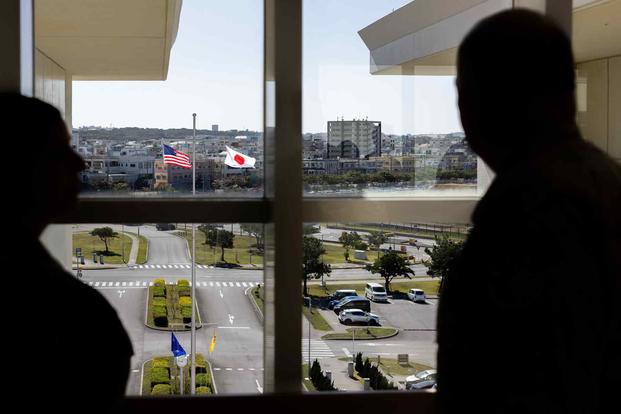The Defense Department is rolling out a new pilot program to help civilian employees in Japan access medical care, and while it may remove some of the process’s roadblocks, advocates say additional improvements are needed.
The Pilot Health Insurance Enhancement program, announced earlier this month, will be available at no cost to employees enrolled in a participating Federal Employees Health Benefits programs and non-appropriated fund employees who have an Aetna International plan.
The $4.2 million, nine-month contract with International SOS Government Services Inc., Tricare’s overseas contract manager, will provide a 24-hour-a-day call center manned by bilingual staff to help callers find providers, make appointments and receive upfront payment guarantees starting Jan. 1, according to a DoD release Oct. 7.
Read Next: Pentagon Discloses 21 Allegations of Sexual Misconduct in JROTC As It Outlines Reforms to Congress
“In keeping with Secretary of Defense Lloyd J. Austin III’s commitment to taking care of all our people, we owe it to our civilians to facilitate access to health care no matter where they are,” Ashish Vazirani, acting undersecretary of defense for personnel and readiness, said in a statement.
Civilian DoD employees and their dependents have faced troubles getting health care in Japan since at least 2022, when the Defense Health Agency announced it would only provide treatment in military hospitals and clinics on a space-available basis.
After receiving pushback, the DHA later changed its policy, saying civilians could continue getting treatment at military hospitals for chronic conditions but would have to go to Japanese providers for acute care.
Last November, DHA Director Lt. Gen. Telita Crosland promised reforms by the end of 2024 that would address the problems. The pilot is the result of this yearlong effort, according to the Defense Department.
“The support from this pilot program will help enhance the patient experience for the approximately 11,000 civilians stationed in Japan through the new pilot,” Vazirani said.
Advocates say they have concerns that the program covers employees only and not dependents, a “serious shortcoming,” according to Japan Civilian Medical Advocacy, a grassroots group made up of affected employees and dependents.
It also does not appear to include contractors or those assigned to Japan on temporary duty, according to the group.
Randi Wilson, a civilian Defense Department employee and JCMA member, said she has additional concerns about the program’s effectiveness, given that agreements already exist between DoD and International SOS that provide similar services.
On the upside, she said, the program would help those who don’t speak Japanese to navigate the country’s health-care system and make appointments.
However, it won’t help facilitate emergency care, does not prevent denial of care (Japanese facilities aren’t required to accept patients, even in life-threatening emergencies) and does not address the need for improvement of military health facilities in Japan, Wilson told Military.com in an email.
“This program missed the mark. It doesn’t solve the big problems that continue to unnecessarily endanger the total force in Japan; I’m talking preventable deaths, preventable disabilities, preventable child development issues and more happening to military and civilian personnel alike,” Wilson said.
From 2022 through January 2024, at least 24 service members, civilian DoD employees or military dependents were turned away for emergency medical care from Japanese hospitals and four died, including the 7-year-old daughter of a U.S. Marine and a civilian employee who suffered a heart attack and was denied care at 10 facilities before he died.
In March, a bipartisan group of lawmakers wrote Crosland and Assistant Secretary of Defense for Health Affairs Dr. Lester Martinez Lopez, pressing for improvements to medical care for military personnel, civilians and families in Japan.
“We appreciate the steps that DHA and INDOPACOM [U.S. Indo-Pacific Command] are taking to address these issues. But we continue to be concerned by reports of problems accessing care, and its impact on morale and retention,” wrote Democratic Sens. Elizabeth Warren of Massachusetts and Tim Kaine of Virginia, and Rep. Michael Burgess, R-Texas.
Wilson said she hoped DoD, after a year of deliberation, would commit to improving the military treatment facilities in Japan. She also would like the Pentagon to inform civilian employees and military personnel of the country’s limitations to emergency and mental health services, remove state licensing restrictions to enable access to telehealth and enact hiring reform to hire spouses who are health-care professionals.
“After more than a year of deliberation, dozens of denied emergency cases and deaths, and hundreds of denials of care, why is this program the only result? Why haven’t we seen less costly and more impactful steps?” Wilson asked.
The pilot will run through Sept. 29, 2025. The DHA plans to announce more details about the program before the start of open season for federal benefits enrollment. Open season is scheduled this year from Nov. 11 to Dec. 9.
Related: Staffing Shortages Hit Naval Hospital Okinawa, Causing Chaos for Expecting Moms
Story Continues
Read the full article here

